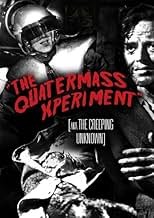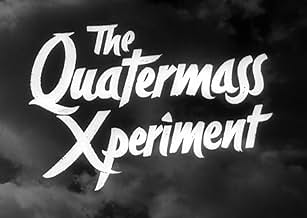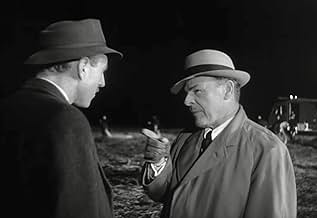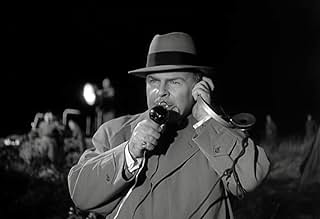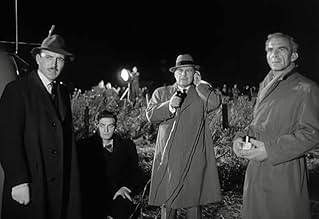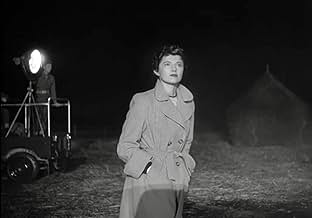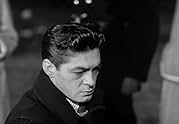IMDb RATING
6.6/10
8K
YOUR RATING
Professor Bernard Quatermass' manned rocket ship returns to Earth, but two of the astronauts are missing and the survivor seems ill and unable to communicate.Professor Bernard Quatermass' manned rocket ship returns to Earth, but two of the astronauts are missing and the survivor seems ill and unable to communicate.Professor Bernard Quatermass' manned rocket ship returns to Earth, but two of the astronauts are missing and the survivor seems ill and unable to communicate.
- Director
- Writers
- Stars
Jane Aird
- Mrs. Lomax
- (uncredited)
Margaret Anderson
- Maggie
- (uncredited)
Jane Asher
- Little Girl
- (uncredited)
Harry Brunning
- Night Porter
- (uncredited)
Ken Buckle
- Police Driver
- (uncredited)
Eric Corrie
- Maggie's Boyfriend
- (uncredited)
Edward Dane
- Station Policeman
- (uncredited)
Gron Davies
- Charles Green
- (uncredited)
- Director
- Writers
- All cast & crew
- Production, box office & more at IMDbPro
Featured reviews
Well written and terminally fascinating British sci-fi thriller from director Val Guest and writer Nigel Neale. It is a film of big ideas and planet-sized concepts that stares up into the unknown with a combination of wonderment and dread.
Originally a highly popular TV series, it spawned two excellent sequels and decades of creative Hollywood pilfering.
Brian Donlevy is wonderful as Quatermass, a scientist with the bullying manner of a military drill Sargent and a fierce, pragmatic streak. After a rocket that he sent into space crashes back to Earth, Quatermass and unofficial partner-in-crime Inspector Lomax (Jack Warner) uncover a bizarre alien conspiracy in which a surviving astronauts's body has been "borrowed" by extraterrestrials keen on relocating.
Director Guest gives the drama a no-nonsense, almost documentary feel. The special effects are perfectly acceptable for the period and the brooding sense of mid-century paranoia is well conveyed.
The hero is the script, though. The dialogue is fresh and colourful and writers Guest and Neale always keep the scientific jargon interesting. All the characters are believable and the performances are top notch.
Despite the fact that James Bernard's solid score is a little overbearing at times, this is a dashingly good science fiction film with a strong stench of horror.
Originally a highly popular TV series, it spawned two excellent sequels and decades of creative Hollywood pilfering.
Brian Donlevy is wonderful as Quatermass, a scientist with the bullying manner of a military drill Sargent and a fierce, pragmatic streak. After a rocket that he sent into space crashes back to Earth, Quatermass and unofficial partner-in-crime Inspector Lomax (Jack Warner) uncover a bizarre alien conspiracy in which a surviving astronauts's body has been "borrowed" by extraterrestrials keen on relocating.
Director Guest gives the drama a no-nonsense, almost documentary feel. The special effects are perfectly acceptable for the period and the brooding sense of mid-century paranoia is well conveyed.
The hero is the script, though. The dialogue is fresh and colourful and writers Guest and Neale always keep the scientific jargon interesting. All the characters are believable and the performances are top notch.
Despite the fact that James Bernard's solid score is a little overbearing at times, this is a dashingly good science fiction film with a strong stench of horror.
A British spaceship returns to Earth but instead of celebrating this first space shot, there is a lot of confusion, as two of the three crew members are missing. Additionally, the one who DID return just doesn't look or act right and he's kept under supervision and monitored as his body seems to be undergoing some sort of metamorphosis.
This isn't exactly your standard 1950s sci-fi/monster film, as the story itself is more tightly written and seems more credible than the typical "bug-eyed monster" film. Instead of the over the top acting and silly special effects, this is a more cerebral style film and the "monster" doesn't even make an appearance until near the very end. Instead, the story slowly unfolds and at the same time, simple makeup does the trick--no ping pong ball eyes, giant killer lobsters or any of the sort of tripe seen in the sillier examples of the genre. About the only negative was the whole subplot of the wife trying to kidnap her husband away from the hospital--this didn't make a lot of sense. Still, overall it's a dandy sci-fi film and worth a look.
This isn't exactly your standard 1950s sci-fi/monster film, as the story itself is more tightly written and seems more credible than the typical "bug-eyed monster" film. Instead of the over the top acting and silly special effects, this is a more cerebral style film and the "monster" doesn't even make an appearance until near the very end. Instead, the story slowly unfolds and at the same time, simple makeup does the trick--no ping pong ball eyes, giant killer lobsters or any of the sort of tripe seen in the sillier examples of the genre. About the only negative was the whole subplot of the wife trying to kidnap her husband away from the hospital--this didn't make a lot of sense. Still, overall it's a dandy sci-fi film and worth a look.
You can't even begin to describe how essential (and quintessential) this legendary Hammer-movie in fact is! It was the unexpected success of this movie that single-handedly caused the horror-boom all over Europe! If this adaptation from Nigel Kneale's play hadn't been so popular, Hammer Studios probably never would have started with re-telling other famous franchises, such as "Frankenstein", "Dracula" or "The Mummy". It was "The Quatermass Xperiment" that all of a sudden showed that the audience's hunger for morbid Sci-Fi and fantasy tales is insatiable and Hammer cleverly exploited this given bit by bit. The film itself is about 50 years old now, but it definitely still stands as one of the uncanniest and mesmerizing Sci-Fi films ever made. With its uniquely tense atmosphere, the astonishing performance by Richard Wordsworth and the intelligent script, this movie is an experience that'll keep you on the edge of your seat the whole time. Quatermass is the name of a brilliant (but slightly obnoxious) scientist who apparently without permission of the legal authorities launched a rocket with a 3-headed crew into space, to travel distances no other space-mission ever reached. The movie opens when a catastrophe already took place and the rocket crashes just outside London. Two crew members seemly vanished into thin air while the other (Wordsworth) is "possessed" with something. The unfortunate astronaut inexplicably turns into a monster that threatens to extinguish the entire world
The premise of alien-intelligence invading earth through an unfortunate space-mission is extremely stereotyped by today's standards, but "The Quatermass Xperiment" is one of the only oldies in the genre that still feels genuine and original. A form of criticism I often encountered while browsing through other users' comments is that this production supposedly hasn't dated well and that it's nowhere near scary. Frankly, I don't share this opinion at all. First and foremost because the film suggests more terror rather than showing it explicitly! I am aware that few people nowadays appreciate horror film if it doesn't contain graphic violence and tons of blood, but it really is the unsettling atmosphere what makes this film so brilliant. And besides, I do think that the special and make-up effects are staggering although half a century old. The images of Wordsworth mutating arm wrapped in a filthy overcoat and his facial metamorphose are still definitely creepy! To wrap it all up: "The Quatermass Xperiment" is an exhilarating and trend-setting genre film that should be viewed by every fan of fantasy-flicks. Giant thumbs up for director Val Guest who also made another Hammer classic, "The Abominable Snowman"
The premise of alien-intelligence invading earth through an unfortunate space-mission is extremely stereotyped by today's standards, but "The Quatermass Xperiment" is one of the only oldies in the genre that still feels genuine and original. A form of criticism I often encountered while browsing through other users' comments is that this production supposedly hasn't dated well and that it's nowhere near scary. Frankly, I don't share this opinion at all. First and foremost because the film suggests more terror rather than showing it explicitly! I am aware that few people nowadays appreciate horror film if it doesn't contain graphic violence and tons of blood, but it really is the unsettling atmosphere what makes this film so brilliant. And besides, I do think that the special and make-up effects are staggering although half a century old. The images of Wordsworth mutating arm wrapped in a filthy overcoat and his facial metamorphose are still definitely creepy! To wrap it all up: "The Quatermass Xperiment" is an exhilarating and trend-setting genre film that should be viewed by every fan of fantasy-flicks. Giant thumbs up for director Val Guest who also made another Hammer classic, "The Abominable Snowman"
Before a little British company called Hammer became famous for Dracula and Frankenstein, there were the adventures of Professor Bernard Quatermass. Based on the live BBC serial from 1953, The Quatermass Xperiment put Hammer on the film world map. How that happened it obvious from this tense, realistic, and gritty science fiction classic.
The film is immensely helped by an excellent cast. Brian Donlevy's Quatermass is the archetype science fiction film scientist: a scientist obsessed with their quest for science before turning having to deal with the consequences of that quest. Donlevy plays Quatermass to perfection as a scientist who is both horrified and fascinated by the events he has set in motion. It's a strong performance filled with realism. fascination and horror. The cast also includes terrific performances from Jack Warner as Scotland Yard's Inspector Lomax, Margia Dean who takes the potentially clichéd Judith Carroon and puts flesh and blood on the character, and David King-Wood as Quatermass's fellow scientist Doctor Briscoe. The best performance of the film may well be from the character who never speaks: Richard Wordsworth as Victor Carroon. Wordsworth perfectly plays both the horror of the lone surviving astronaut and also sympathy as the worst off victim of the Quatermass experiment. This is especially true in a scene where Caroon finds himself at a dock where a little girl approaches him with her doll. It reminds one of the scene from the Universal Frankensein where the seemingly innocent takes on a darker meaning. Overall, the film has a terrific cast of actors bringing it to life.
At a time when science fiction films were defined by the clichéd and outrageous monster and alien invasion films, this film (and its TV counterpart) went in the exact opposite direction. Director Val Guest choose to do the film not in the style of the time but in a near documentary style. That's why the film work's fifty years later: it seems real in that it is a product of its time are place. If Britian had started the space race in the mid-1950's, one feels this is how it would have been.
The film is also helped by two very strong elements: the black and white cinematography and the music score. Doing the film in black and white adds atmosphere to a film that is part alien invasion and part manhunt. It helps especially in the film's fiery finale. The music score by James Bernard is terrific in adding to the atmosphere of the film and it never intrudes, but just helps to bring one a little bit closer to the edge of one's seat. The film wouldn't be the same without either one of these two elements.
Yet as much as I would like to call this film perfect, it isn't. There is one thing that the film hits and misses on: special effects. The downside of the film being so much a product of its time is that when the special effects are looked back at from a distance, they look primitive. That's not to say that the special effects are bad. The prosthetics work in particular looks good even by today's standards as far as I'm concerned. The finale of the film is the most obvious spot where the special effects are a bit of a let down by modern standards. Then again, it is hard to compare special effects from one era to another so this is an issue for the viewer to decide on.
While the special effects may hamper the film for some, one must admit that The Quatermass Xperiment is a classic of the genre. From the terrific performance (espeically of Donlevy and Wordsworth), to the realistic style and tone, to the excellent cinematography, to the dark score by Jame Bernard, The Quatermass Xperiment is a tour de force for the more intelligent and less action based science fiction films. If you can put aside the mid-1950's special effects, you're going to find a tense, realistic, and gritty science fiction classic.
The film is immensely helped by an excellent cast. Brian Donlevy's Quatermass is the archetype science fiction film scientist: a scientist obsessed with their quest for science before turning having to deal with the consequences of that quest. Donlevy plays Quatermass to perfection as a scientist who is both horrified and fascinated by the events he has set in motion. It's a strong performance filled with realism. fascination and horror. The cast also includes terrific performances from Jack Warner as Scotland Yard's Inspector Lomax, Margia Dean who takes the potentially clichéd Judith Carroon and puts flesh and blood on the character, and David King-Wood as Quatermass's fellow scientist Doctor Briscoe. The best performance of the film may well be from the character who never speaks: Richard Wordsworth as Victor Carroon. Wordsworth perfectly plays both the horror of the lone surviving astronaut and also sympathy as the worst off victim of the Quatermass experiment. This is especially true in a scene where Caroon finds himself at a dock where a little girl approaches him with her doll. It reminds one of the scene from the Universal Frankensein where the seemingly innocent takes on a darker meaning. Overall, the film has a terrific cast of actors bringing it to life.
At a time when science fiction films were defined by the clichéd and outrageous monster and alien invasion films, this film (and its TV counterpart) went in the exact opposite direction. Director Val Guest choose to do the film not in the style of the time but in a near documentary style. That's why the film work's fifty years later: it seems real in that it is a product of its time are place. If Britian had started the space race in the mid-1950's, one feels this is how it would have been.
The film is also helped by two very strong elements: the black and white cinematography and the music score. Doing the film in black and white adds atmosphere to a film that is part alien invasion and part manhunt. It helps especially in the film's fiery finale. The music score by James Bernard is terrific in adding to the atmosphere of the film and it never intrudes, but just helps to bring one a little bit closer to the edge of one's seat. The film wouldn't be the same without either one of these two elements.
Yet as much as I would like to call this film perfect, it isn't. There is one thing that the film hits and misses on: special effects. The downside of the film being so much a product of its time is that when the special effects are looked back at from a distance, they look primitive. That's not to say that the special effects are bad. The prosthetics work in particular looks good even by today's standards as far as I'm concerned. The finale of the film is the most obvious spot where the special effects are a bit of a let down by modern standards. Then again, it is hard to compare special effects from one era to another so this is an issue for the viewer to decide on.
While the special effects may hamper the film for some, one must admit that The Quatermass Xperiment is a classic of the genre. From the terrific performance (espeically of Donlevy and Wordsworth), to the realistic style and tone, to the excellent cinematography, to the dark score by Jame Bernard, The Quatermass Xperiment is a tour de force for the more intelligent and less action based science fiction films. If you can put aside the mid-1950's special effects, you're going to find a tense, realistic, and gritty science fiction classic.
The Quatermass series both inspired and paved the way for many sci-fi greats that would follow it, from shows such as 'Doctor Who' to 'Alien'. Indeed both of these examples successfully blended horror with sci-fi just as Quatermass did right in its very first outing - 'The Quatermass Experiment'. The horror element no doubt also inspired Hammer Films to do this remake only two years after the original series, and they do it well.
Pre-dating Gagarin's successful trip into space, the story involves the first successfully-manned rocket returning from its maiden voyage. The program is headed by professor Bernard Quatermass of the British Rocket Group - a man extremely determined to push the frontiers of science - even if it means sacrificing lives. There's more than a touch of Jules Verne's science-is-the-beginning-and-the-ending about this man. Unfortunately, upon the rocket's return, where there were once three men there is now but one. To top it off, he doesn't seem to be feeling especially well - and it isn't travel sickness.
In 'Xperiment', Quatermass is portrayed by American Brian Donlevy, no doubt to broaden the film's potential market. Donlevy gives his version absolute conviction - this is a man who will not be stopped by any setbacks, convinced as he is that humans must become an interplanetary species. We really need people like him today. Other well-known actors of the day round out the strong cast, but I'd also like to give special mention to Richard Wordsworth, as the troubled sole-surviving astronaut Victor Caroon. Wordsworth could convey so much with just his face that he has presence without uttering a word.
The film also capitalises on the way space - particularly then, is a great unknown, where anything nice or nasty could happen simply by being there. As a result of the rocket's return, something wicked this way does come, and Hammer show their great skill not only in realising it effectively, but in creating wonderfully suspenseful moods in between. Doubtless the monochrome provides many more helpful dark shadows in this endeavour, but the production values really are more than good enough to convince even today.
So with a fascinating story by creator Nigel Kneale, well-chosen actors, and an excellent big-screen realisation, 'The Quatermass Xperiment' still shows why it pioneered what was to come. But more than that, it's still excellent in its own right.
Pre-dating Gagarin's successful trip into space, the story involves the first successfully-manned rocket returning from its maiden voyage. The program is headed by professor Bernard Quatermass of the British Rocket Group - a man extremely determined to push the frontiers of science - even if it means sacrificing lives. There's more than a touch of Jules Verne's science-is-the-beginning-and-the-ending about this man. Unfortunately, upon the rocket's return, where there were once three men there is now but one. To top it off, he doesn't seem to be feeling especially well - and it isn't travel sickness.
In 'Xperiment', Quatermass is portrayed by American Brian Donlevy, no doubt to broaden the film's potential market. Donlevy gives his version absolute conviction - this is a man who will not be stopped by any setbacks, convinced as he is that humans must become an interplanetary species. We really need people like him today. Other well-known actors of the day round out the strong cast, but I'd also like to give special mention to Richard Wordsworth, as the troubled sole-surviving astronaut Victor Caroon. Wordsworth could convey so much with just his face that he has presence without uttering a word.
The film also capitalises on the way space - particularly then, is a great unknown, where anything nice or nasty could happen simply by being there. As a result of the rocket's return, something wicked this way does come, and Hammer show their great skill not only in realising it effectively, but in creating wonderfully suspenseful moods in between. Doubtless the monochrome provides many more helpful dark shadows in this endeavour, but the production values really are more than good enough to convince even today.
So with a fascinating story by creator Nigel Kneale, well-chosen actors, and an excellent big-screen realisation, 'The Quatermass Xperiment' still shows why it pioneered what was to come. But more than that, it's still excellent in its own right.
Did you know
- TriviaThe film achieved notoriety Stateside when in 1956 the parents of Stewart Cohen attempted to sue Chicago's Lake Theater and distributors United Artists for negligence after their nine-year-old son died of a ruptured artery at a double-bill of this and Les monstres se révoltent (1956) on Sunday 28th October, during the opening sequence of the Hammer movie. Cohen entered the Guinness Book of Records as the only known case of someone literally dying of fright at a horror film (he had been unknowingly living with an undiagnosed heart condition): pathologist Dr Albert Baugher officially found that "The boy died of a heart collapse after extraordinary tension while watching a film."
- GoofsVolkswagen Bus en route to the crash site is not the same Volkswagen Bus that arrives through the gate at the crash site. VW badge is larger, chrome trim is missing and license plate is different.
- Quotes
Prof. Bernard Quatermass: There's no room for personal feelings in science, Judith!
- Alternate versionsThe original 1955 "Quatermass Xperiment" print has the closing caption "The End"; the reissued version (with a still bearing the new title "The Quatermass Experiment" inserted into the opening credits) replaces this with "A Hammer Production Produced at Bray Studios".
- ConnectionsFeatured in Frances Farmer Presents: The Creeping Unknown (1959)
- How long is The Quatermass Xperiment?Powered by Alexa
Details
- Release date
- Country of origin
- Language
- Also known as
- Pánico mortal
- Filming locations
- East India Docks, London, Greater London, England, UK(derelict boat scene with little girl)
- Production company
- See more company credits at IMDbPro
Box office
- Budget
- £45,000 (estimated)
- Runtime
- 1h 22m(82 min)
- Color
- Sound mix
- Aspect ratio
- 1.37 : 1(original/negative aspect ratio, alternative theatrical ratio)
Contribute to this page
Suggest an edit or add missing content


